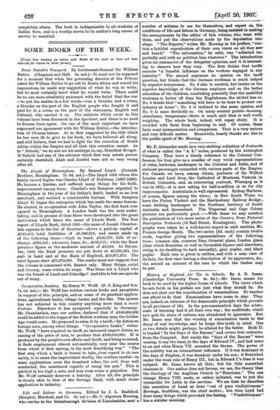Life and Labour in Germany. Edited by J. L. Bashford.
(Simpkin, Marshall, and Co. 2s. net.)—Mr. C. Algernon Horsing, who resides in the Oainaborough division of Lincolnshire, sent a number of artisans to see for themselves, and report on, the conditions of life and labour in Germany, being waited in nieking f the arrangements by the editor of this voltime, Who irent with them, and put the observations made by the deputation into shape. "The Reports," writes Mr. Moreing in his preface. "con.' tam n a faithful reproduction of their own views on all they saw, and heard." "The information," he adds, was "collected im- partially and with no political bias whatever." The intiothiction • gives six summaries of the delegates' opinions, and it is interest- ing to observe how they vary. The first thinks that tariffs' exercise "a baneful influence on the workers engaged in any industry." The second expresses no opinion on the tariff question, but thinks that the German workman is much helped by superior temperance. No. 8 also is neutral, but insists: on the superior knowledge of the German employer and on the better education of the children, concluding generally that the unskilled workman is better off than the Englishman, the skilled less so. No. 4 thinks that "something will have to be done to protect our industry at home"; No. 5 is inclined to the same opinion, and No. 6 is more decidedly so. On many neutral points—housing, cleanliness, temperance—there is much said that is well worth weighing. The whole book, indeed, will repay Study. It is crowded with feats from beginning to end. Of course, these facts want interpretation and comparison. That is a very serious and very difficult matter. Meanwhile, hearty thanks are due to the publics spirit of Mr. Honing.










































 Previous page
Previous page